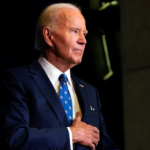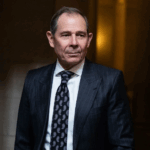Mark Carney, former governor of the Bank of England, has announced his candidacy for the leadership of Canada’s ruling Liberal Party, following Justin Trudeau’s resignation last week. Trudeau stepped down after a challenging period marked by poor polling and mounting frustration within his own party, ending his nine-year tenure at the helm of Canadian politics.
Carney, 59, confirmed his intention to run in the Liberal leadership race set for March 9, with a general election expected shortly afterward. While the Liberals have been in power since 2015, the party faces significant challenges in the upcoming election, with the opposition Conservatives—led by populist Pierre Poilievre—holding a commanding lead in the polls.
“I’m doing this because Canada is the best country in the world, but it could still be even better,” Carney said during his announcement in Edmonton, Alberta. He highlighted key issues facing the country, including stagnant wages, climate change, escalating housing costs, and the looming threat of a trade conflict with the United States under former President Donald Trump.
Carney is expected to lean heavily on his extensive financial expertise, having led both the Bank of Canada and the Bank of England—making him the only individual to have governed two G7 central banks. “I’m here to earn your trust,” Carney stated. “I’m here to ask for your support.”
Carney’s main rival in the race for Liberal leadership appears to be Chrystia Freeland, 56, the former finance minister who resigned in frustration over disagreements with Trudeau, which in turn contributed to his departure. Following the leadership contest in March, a confidence vote in the House of Commons will likely trigger a general election later in the year.
Meanwhile, Poilievre, 45, leader of the Conservative Party, remains a strong favorite to become the next prime minister. His promises to reduce government spending, tackle crime, and eliminate carbon taxes have struck a chord with disillusioned voters. Poilievre has previously dismissed Carney as a “liberal insider” and likened him to Trudeau, calling him “Just like Justin.”
As the leadership race intensifies, the future of the Liberal Party and Canada’s political landscape remains uncertain, with both Carney and Freeland vying for the top spot in a party facing the threat of defeat in the upcoming election.









